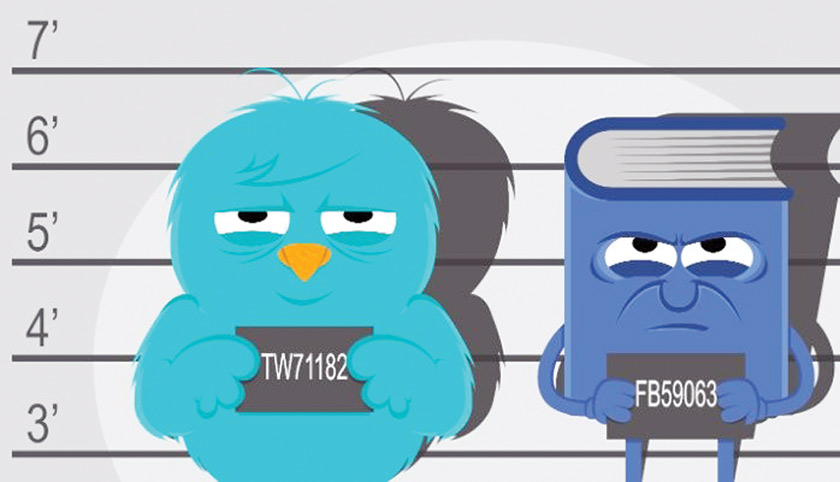Like sheep to the slaughter
INTROSPECTION
It will be illegal to spread "false statements of fact" in Singapore, where that information is "prejudicial" to Singapore's security, public safety, "public tranquility," or to the "friendly relations of Singapore with other countries" under the Protection from Online Falsehoods and Manipulation Bill. Individuals found guilty of contravening the act can face fines or be imprisoned. What exactly is "a false statement of fact" will be defined by the government. Facebook's director of public policy for Asia-Pacific, Simon Milner, commented that while the company in principle supported regulation on spreading online falsehoods, it had concerns at the law's granting of "broad powers to the Singapore executive branch to compel us to remove content they deem to be false and proactively push a government notification to users."
A couple of days ago, Australia introduced new legislation in response to New Zealand’s Christchurch massacre; the UK government proposed sweeping new powers to tackle violent control, fake news, and harmful content, the US Democratic presidential candidate proposed the creation of a news and information ombudsman “with the power to fine egregious corporate offenders.” (Source: CNN)
Every individual has a right to freely express him or herself. In this digital age, however, that often comes at the expense of being bullied or threatened. There are actual people – and, well, bots created to serve similar purpose really – who leverage this “power” to exploit the social media platforms. Keeping aside the role of these tech companies, if governments are to ensure no personal space is being breached and no citizen is being targeted unfairly as they fight cases of online harassment and spreading of fake or malicious information, then they need to implement a carefully-designed monitoring system.
The key to achieving this is clear guidelines. Laws that are categorically vague provide room for misuse.
For instance, Article 19 of the Constitution of Pakistan states: “Every citizen shall have the right to freedom of speech and expression and there shall be freedom of press, subject to any reasonable restrictions imposed by law in the interest of the glory of Islam or the integrity, security or defence of Pakistan or any part thereof, friendly relations with foreign states, public order, decency or morality, or in relation to contempt of court (commission of) or incitement to an offence.” If one regards the Constitution as a text written in English language, they would conclude that the State is not conferring this right; it’s simply recognising a pre-existing right here.
In yet another law, the very broadly-worded Anti-Terrorism Act, a person can be punished, besides obvious reasons of inciting terrorism, if they use threatening, abusive or insulting words or behaviours. There are no executive guidelines or a particular threshold mentioned regarding “insult” that could be referred to when prosecuting someone under the Anti-Terrorism Act.
Then there is Prevention of Electronic Crimes Act wherein whoever prepares or disseminates information, through any information system or device, which advances or is likely to advance inter-faith, sectarian or racial hatred, shall be punished. Again, it’s an open criterion, one that can be used by State to punish unpopular points of view and criticism.
Last but not the least, is Pakistan Electronic Media Regulatory Authority Ordinance mandated to preserve the “sovereignty, security and integrity” of Pakistan and “ensure that all programmes and advertisements do not contain or encourage violence, terrorism, racial, ethnic or religious discrimination, sectarianism, extremism, militancy, hatred, pornography, obscenity, vulgarity or other material offensive to commonly accepted standards of decency”.
So, what if this “hate speech” is not intentional, that it is perhaps just another perspective? And, let’s suppose, that the hate speech does exist, is prosecution through FIR the only remedy for it? Whatever happened to engaging in constructive debates, challenging the other narrative, giving people another chance? There should always be a clear distinction between speech and when it’s an offence. If somebody is inciting a group to commit a crime, to damage a property, or attack another person, then they should definitely be arrested. But, it’s not okay to criminalise “hate speech” by and of itself without specifying what’s considered “insult, what’s “hatred”; without this distinction, as soon as a person say something which is an insult, it would become a crime even when it’s not a threat of criminal violence!
As a consumer of social media, I find it disturbing how these laws affect my immediate liberty, to know that something as basic as questioning can land me in trouble. What if I come across some piece of fake news; how do I verify the source without being held responsible for spreading it? With no transparency, the problem is everybody would look out for their own interests and any stakeholder who deems anything offensive would find it alright to monitor content and would find it alright to take action against it. With no transparency, why will people trust the system? This is not regulation. It is, in fact, censorship.
How does one escape it?
According to one lawyer, we need to advocate – at multiple levels – that prosecutors are trained better, that clear guidelines are provided to rule different levels of offence, but more importantly, that there is engagement at multiple levels involving large scale reforms. There’s going to be no difference if the institutions continuously say that everything is punishable, that everything has a consequence. Things will improve overtime only when there will be counter narrative.
Like sheep to the slaughter
 Reviewed by Pak 24 News
on
April 12, 2019
Rating:
Reviewed by Pak 24 News
on
April 12, 2019
Rating:
 Reviewed by Pak 24 News
on
April 12, 2019
Rating:
Reviewed by Pak 24 News
on
April 12, 2019
Rating:










No comments: